EWOSA News - February 2022

- Home
- EWOSA News - February 2022
Welcome to the latest edition of the Energy and Water Ombudsman SA (EWOSA) quarterly newsletter: your one stop shop for emerging consumer trends, hot issues and policy matters.
From the Ombudsman
COVID-19 remains the most pressing issue for our community, and the Australian Energy Regulator (AER) recently reported on the significant impact the pandemic has had on customers and their ability to pay for essential services such as electricity and gas.
We share the AER’s concerns about rising debt levels for some customers and welcome its continued commitment to protect vulnerable customers. It has released a draft Consumer Vulnerability Strategy to help address the barriers some consumers face to access products and services that best meet their needs.
This follows its introduction of a Statement of Expectations at the onset of the pandemic to address the issues surrounding anticipated payment difficulties for an increased number of customers. This Statement was revised four times then, in June 2021, transformed into a Standby Statement.
Despite the pandemic, complaints to our Scheme about issues relating to hardship and disconnections continue to be at relatively lower levels, in line with the trend in our Annual Report. We have welcomed a determined effort by many energy and water providers to provide enhanced dispute resolution to their customers, which is resulting in a higher number of complaints being resolved before they reach our Scheme.
In reporting on our work, we are now talking about “complaints” rather than “cases”. A case is a contact with us, which is classified as either a “complaint” or an “enquiry”.
A complaint is an expression of dissatisfaction with a Member (an energy or water service supplier) regarding a policy, practice or customer service performance. We endeavour to provide a response or resolution to the complaint using various means, such as conciliation or direct intervention through an Ombudsman’s determination.
Enquiries are requests for information or assistance from customers about a range of issues. They can be general in nature or about specific topics, such as billing or credit. On occasions, we refer an enquiry to another body, such as a regulator or a government department. We consider these enquiries to be broader industry issues.
Complaints within our Scheme about issues relating to hardship and disconnections continue to be at relatively lower levels, in line with the trend in our Annual Report. In December 2021, we received 27 credit complaints, compared with 49 in December 2020. The December 2021 figure was less than the 39 credit complaints in November 2021, equal to the 39 complaints in November 2020. We continue to track these complaints for both energy and water, including reporting on them to the AER and the Essential Services Commission of South Australia on a regular basis.
Overall, fewer complaints were received in the most recent quarter than for the same period in the previous year (1,384 compared with 1,461).
As always, we are here to help. Please contact us on 1800 665 565 or via our website if you need assistance.
Sandy Canale
Energy and Water Ombudsman SA
Consumer Trends 1


Hot Topics
The Australian Energy Regulator’s (AER’s) draft Consumer Vulnerability Strategy was released on 20 December 2021. It introduces five overarching objectives linked to actions and ideas that the AER is exploring further in its consultation process, which runs until 28 February 2022.
The AER has noted that shame and embarrassment can be barriers to a customer being identified as being vulnerable. As AER Chair Clare Savage says, “more needs to be done across the energy sector to break down these barriers so that consumers can access products and services that best meet their needs, that payment difficulties are met with more tailored support, and that the future energy market meets the needs of consumers”.
Source:
Energy bills will be simpler under new rules designed by the Australian Energy Market Commission. Customers can choose to receive more information digitally, with easy access to information about energy efficiency.
The change was initiated by the Federal Energy Minister, the Hon Angus Taylor MP. The aim is to simplify energy bills so customers can better understand and manage their energy usage and costs, and shop around to find a better deal.
A Better Bills Guideline developed by the AER to outline the new billing arrangements must be in place by 1 April 2022. A draft was prepared, and a consultation period ran until 31 January 2022.
Source:
Two energy retailers – Red Energy and Lumo Energy – have proposed to the Australian Energy Market Commission (AEMC) a rule change to better protect customers affected by family violence.
They note that: “Family violence affects a large number of Australians and can occur in any range of circumstances across cultures and communities. It can take many forms, including physical, sexual, social, emotional, and financial abuse, as well as a wide range of coercive and intimidating behaviour. In our experience of implementing family violence protections in Victoria, we have seen the devastating impact family violence can have not only on affected customers but on family members and the wider community.”
The AEMC is holding a forum as part of its consultation on this proposed change. To participate in the forum in February 2022, stakeholders may register interest by emailing ProjectRRC0042@aemc.gov.au. The AEMC also encourages written submissions, which will be received until 3 March 2022.
Source:
Consumer Trends 2
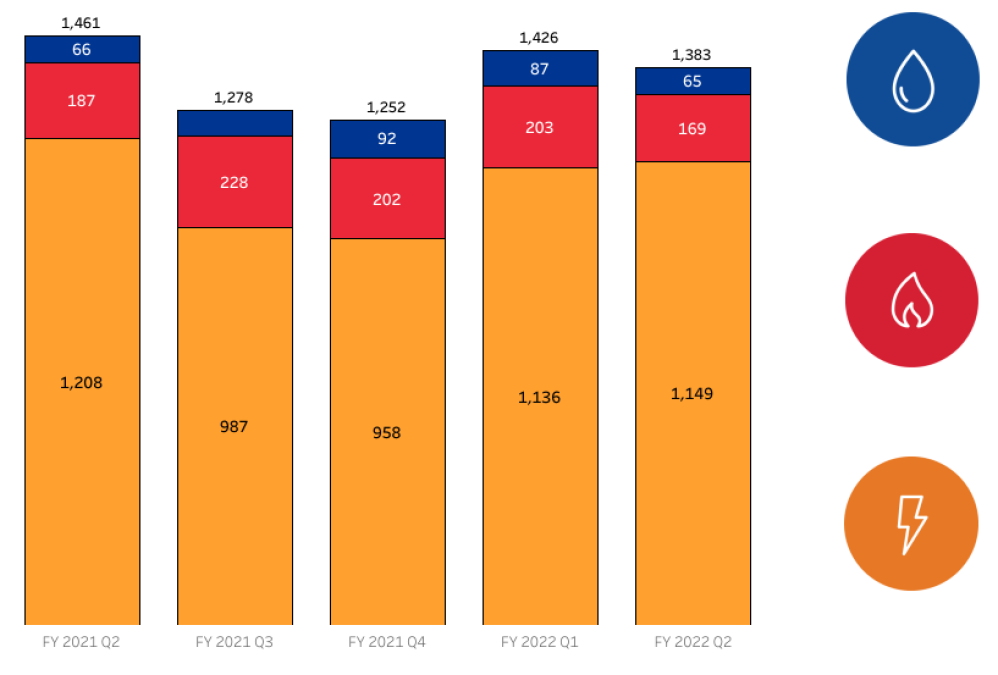

Case Studies
Issues: Billing – Back bill – Denies Responsibility
Utility: Electricity
Customer Type: Business
Case Type: Investigation
The Issue:
Mr X’s supplier issued monthly bills from 1 June 2018 to 1 July 2020, billing less than the usage recorded on the meter, but did not issue a bill from July 2020 until June 2021.
Mr X then received a backdated bill from his supplier for the period June 2018 to June 2021 recovering the undercharging. He disputed the three-year back bill.
Our Review:
We found Mr X’s supplier did not comply with the relevant undercharging rules and attempted to recover charges beyond the allowable nine-month timeframe.
We reviewed the portion of charges that Mr X’s supplier was able to recover and confirmed he was billed correctly.
Resolution:
To comply with the undercharging rules, Mr X’s supplier sent an amended bill that waived the unrecoverable charges of $88,000.
A further $250 goodwill credit was applied to the account for the inconvenience caused and additional time to pay the remaining balance was offered.
Issues: Credit Management – Credit Action Taken in Error – Default Listed in Error
Utility: Electricity
Customer type: Residential
Case type: Investigation
The issue:
Mr D complained about a credit default on his credit file for an electricity account at his previous address. He said he had changed suppliers 14 months before leaving the property and was not aware of an unpaid debt until he applied for a loan and discovered there was a default listing on his credit file.
He paid the debt in full and was dissatisfied when his previous supplier refused to remove the default.
Our review:
We found that Mr D entered a contract to supply electricity at the previous address with his then supplier and was responsible for the electricity charges.
We reviewed the process the supplier undertook before listing the default and found that there was a fault with the time-switch on the meter. The meter was replaced at the time, and the distributor sent adjusted usage to the then supplier.
We found the usage adjustments were not applied to Mr D’s account, which resulted in an overcharge and the default listing for an incorrect amount.
Resolution:
The supplier removed the default, applied the usage credit adjustments, and offered to pay Mr D $200 as a gesture of goodwill.
Consumer Trends 3
Customer Corner
Weather has a massive impact on energy use and the size of energy bills. Using more cooling devices in the long, hot days of summer can result in bill shock post summer.
There are several things that customers can do to manage their situation.
• check out optimum temperature ranges for cooling (and heating) appliances. Ideally, cooling will be at 24-25 degrees. range (air conditioner)
• contact the Energy Advisory Service for advice on the most efficient way to manage energy in the home.
• advise your retailer if you are in payment difficulties and ask to be put on to a payment plan.
• shop around for a better deal. The introduction of the reference price on 1 July 2019 has made it easier to see if you are getting the best deal to meet your needs
• there may be circumstances in which a financial counsellor would be helpful to you, contact 1800 007 007.
More information:
The Essential Services Commission of South Australia is currently consulting on the effectiveness of the off-grid energy consumer protection framework, which applies to around 11,000 customers in regional and remote areas. It has released two fact sheets on the current consumer protections, covering gas and electricity.
Consultation includes a comparison of the Commission’s hardship consumer protections and those contained in the National Energy Customer Framework, and further consultation on the Prepayment Meter System Code review.
Consultation closes on 25 March 2022. You can register your interest in participating in a consultation workshop here.
Source:
ESCOSA: Off-grid consumer protection framework review
A short clip has been released by the Australian Energy Council (AEC) to explain how easy it is to switch electricity providers.
The key message is that if you’re comparing electricity plans, “the easiest way is to enter your NMI - this identifies the meter at your home and makes the comparison personalised, in seconds”.
View the clip: AEC: It’s easy to switch
Public Submissions
Consumer Trends 4
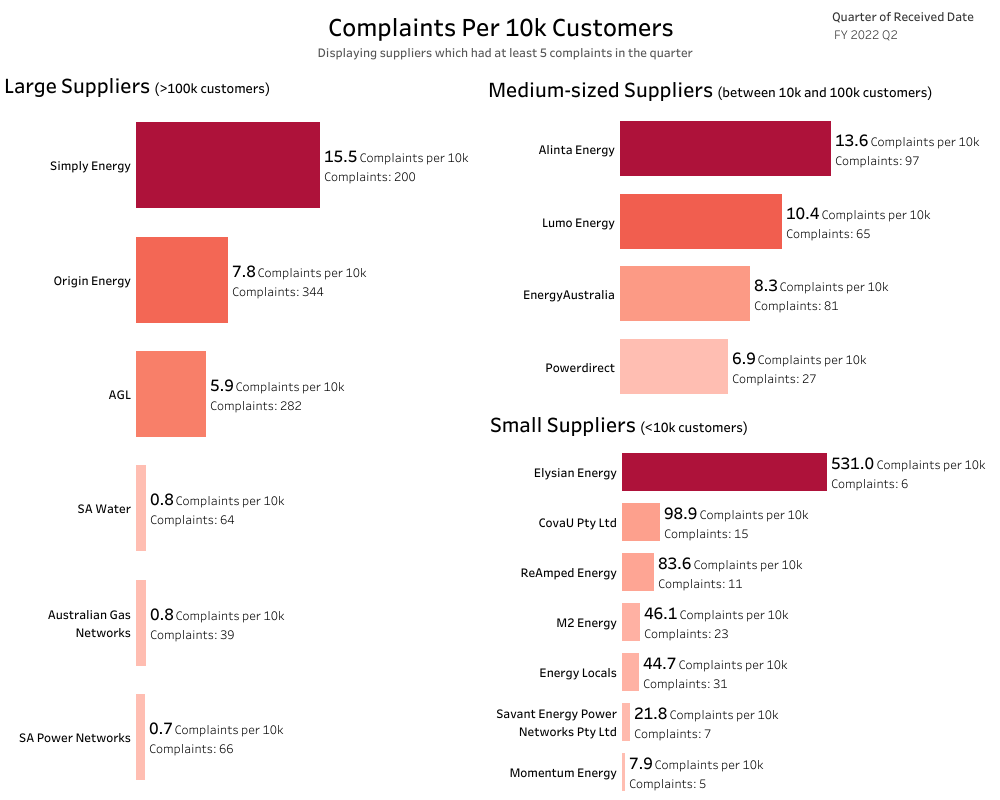
The number of complaints per 10,000 customers for each supplier is calculated by dividing the number of complaints received during the quarter by the total number of customers for each supplier, multiplied by 10,000. Large Suppliers are those with over 100,000 customers, Medium-sized Suppliers have between 10,000 and 100,000 customers, Small Suppliers have between 1,000 and 10,000 customers and Very Small Suppliers have less than 1,000 customers. The total number of complaints is also presented for context.
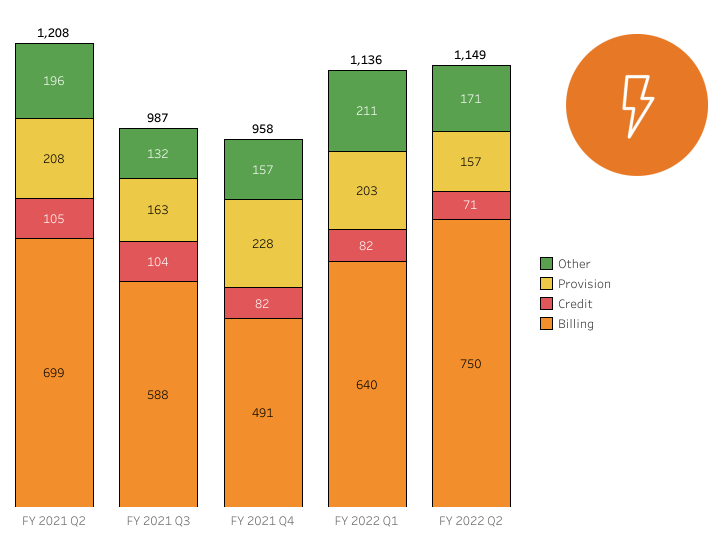
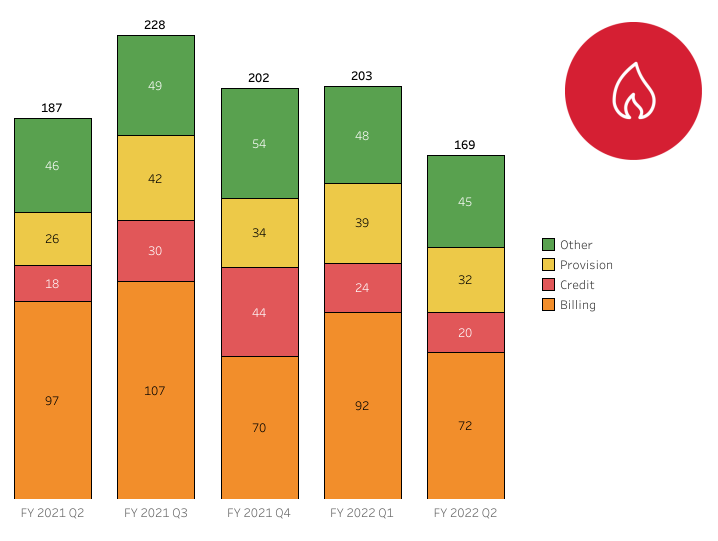
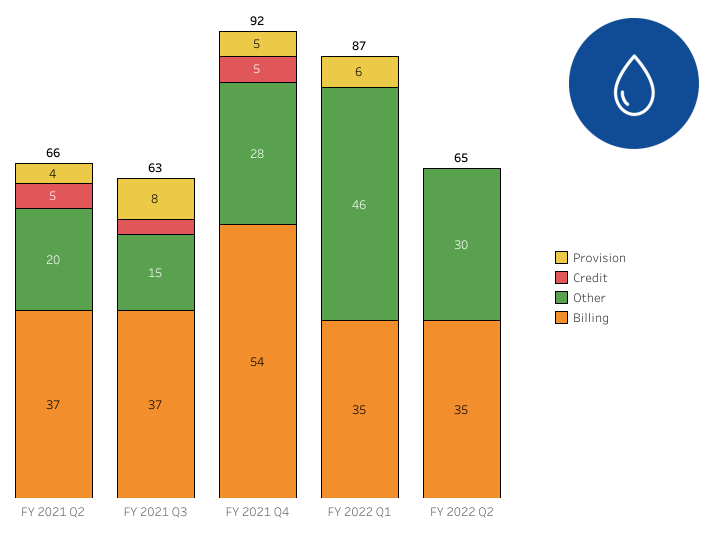
Remember, we are here to help
EWOSA facilitates the prompt resolution of complaints and disputes between consumers of electricity, gas and water services and Members of the Scheme by providing a service to consumers which is free, independent, accessible, fair and informal.
Freecall 1800 665 565
SMS 0488 854 555